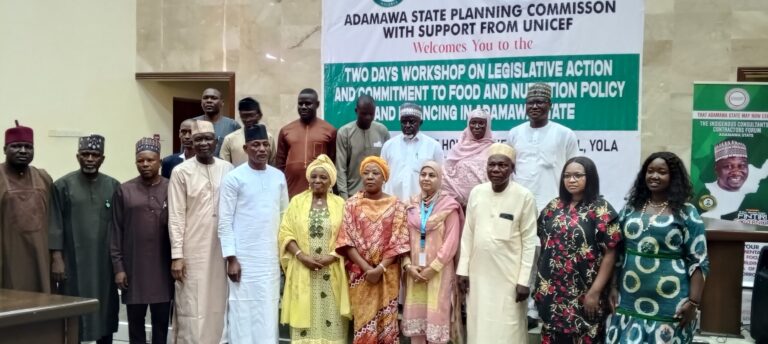By Atoyebi Nike
13th May, 2025
No fewer than 400,000 children in Adamawa State are in urgent need of nutritional treatment, the United Nations Children’s Fund (UNICEF) has revealed.
Dr. Nuzhat Rafique, Chief of UNICEF’s Bauchi Field Office, made this disclosure during a two-day workshop on Legislative Action and Commitment to Nutrition, held in Yola and supported by the Adamawa State Planning Commission and UNICEF.
“The malnutrition crisis in Adamawa is alarming,” Dr. Rafique said. “UNICEF has been providing nutrition supplements, but a collaborative effort is crucial if we are to end this crisis.”
She noted that about 50 percent of children in the state suffer from chronic malnutrition and emphasized the importance of exclusive breastfeeding in a child’s early development.
In response, the Speaker of the Adamawa State House of Assembly, Mr. Bathiya Wesley—represented by the Majority Leader, Kate Mamuno—reaffirmed the legislature’s commitment to supporting nutrition-focused policies and interventions.
“We will back nutrition programmes with appropriate legislation to ensure that our children benefit from effective and sustainable interventions,” Wesley stated.
Philomena Irene, UNICEF’s Nutrition Specialist, added that the workshop aimed to explore multi-sectoral strategies to improve nutrition investment. “This platform encourages collaboration between lawmakers, government agencies, development partners, and civil society to foster impactful nutrition outcomes,” she explained.
Dr. Mary Padinga, Chairperson of the Adamawa State Planning Commission, expressed appreciation for UNICEF’s continued partnership and emphasized the role of robust policy and legislative backing in achieving nutrition goals.
“We are taking deliberate steps to build a sustainable foundation for nutrition programmes. With support from the House of Assembly, we are optimistic that these efforts will gain the legal framework they require,” Dr. Padinga stated.
The workshop marks a renewed push in Adamawa State to address widespread malnutrition among children through coordinated legislative and developmental action.
